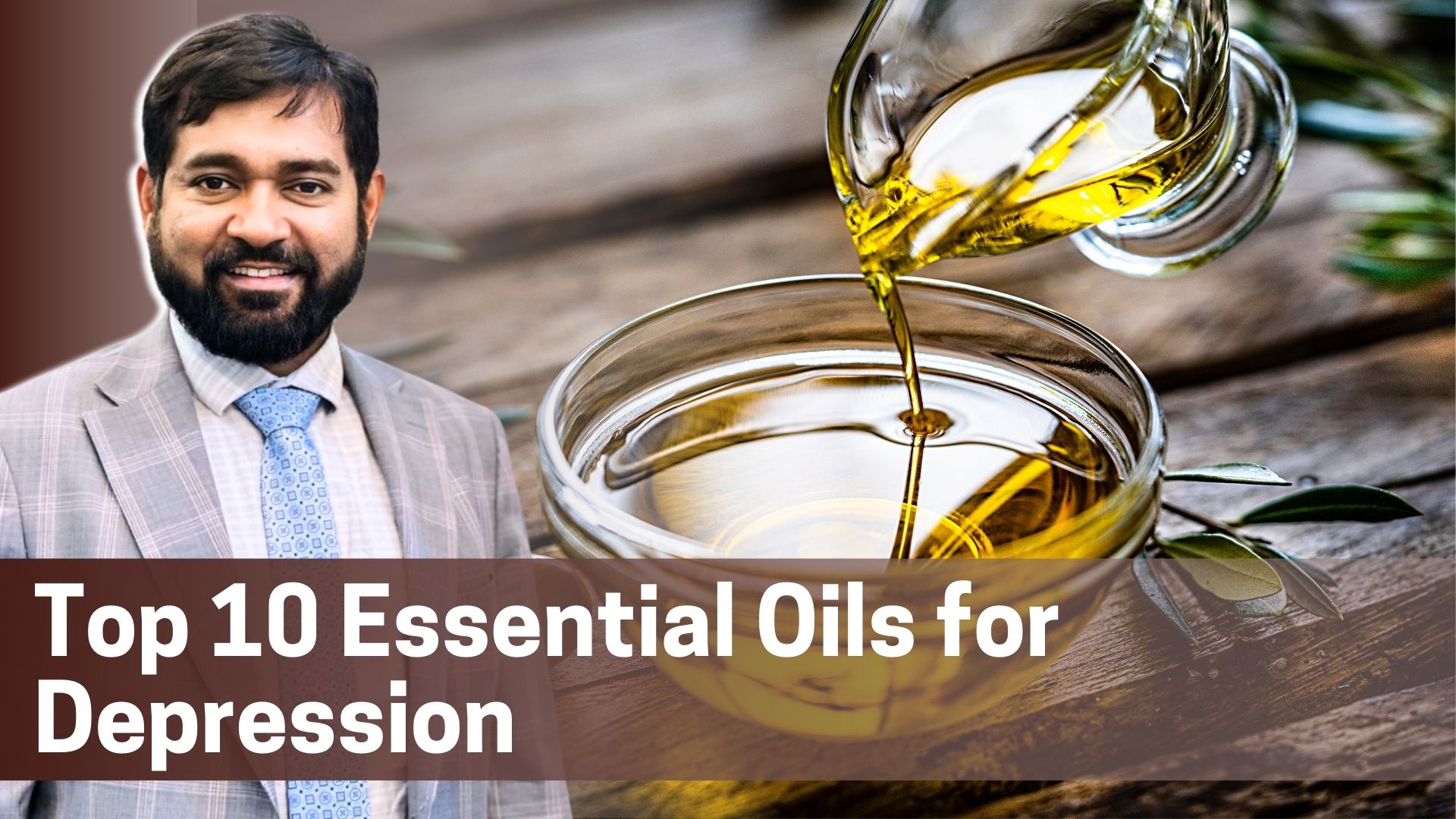21
Top 10 Essential Oils for Depression
Essential oils are concentrated plant extracts that capture the natural fragrance and beneficial properties of the plant. They are typically extracted through steam distillation or cold-pressing methods. Essential oils are used in aromatherapy, massage, and skincare for their therapeutic effects, which can range from relaxation and stress relief to energizing and mood-boosting benefits. Each essential oil has its unique properties depending on the plant it’s derived from, such as lavender for calming, peppermint for stimulating, or eucalyptus for respiratory support. They are highly potent and should be used with care.
1. Bergamot
Bergamot essential oil is derived from the rind of the bergamot orange, a citrus fruit. Its uplifting and refreshing scent is known to promote feelings of happiness and reduce stress. Research has shown that bergamot can lower cortisol levels, which are often elevated during periods of stress and anxiety. The oil is commonly used in aromatherapy to enhance mood and create a calming atmosphere. Inhaling bergamot oil or using it in a diffuser can help alleviate feelings of sadness and promote a sense of well-being. Additionally, bergamot can be blended with carrier oils for topical application, providing soothing effects on the skin while enhancing mood.
2. Lavender
Lavender essential oil is one of the most popular and widely studied essential oils for its calming properties. Known for its sweet floral aroma, lavender has been shown to reduce anxiety, improve sleep quality, and enhance overall emotional health. Studies indicate that inhaling lavender oil can lead to significant reductions in anxiety levels and depressive symptoms. It is often used in relaxation techniques such as massage or added to baths for a soothing experience. Lavender can also be applied topically (diluted with a carrier oil) to pulse points or used in pillow sprays to promote restful sleep.
3. Chamomile
Chamomile essential oil, derived from the flowers of the chamomile plant, is renowned for its calming effects. This oil has been traditionally used to promote relaxation and reduce stress. Its gentle sedative properties may help alleviate feelings of anxiety and depression, making it beneficial for those who struggle with sleep disturbances related to their mood. Chamomile can be used in aromatherapy by adding a few drops to a diffuser or by mixing it with a carrier oil for massage. Drinking chamomile tea is also a popular way to enjoy its calming effects.
4. Ylang Ylang
Ylang ylang essential oil is extracted from the flowers of the Cananga tree and is known for its sweet, floral scent. It has mood-enhancing properties that may help reduce feelings of sadness and promote emotional balance. Ylang ylang can lower blood pressure and heart rate, contributing to an overall sense of calmness. It is often used in aromatherapy blends to uplift mood and reduce anxiety. You can diffuse ylang ylang oil in your home or add it to bathwater for a relaxing soak that helps lift your spirits.
5. Frankincense
Frankincense essential oil has been used for centuries in spiritual practices due to its grounding aroma. It promotes feelings of peace and tranquility, making it beneficial for those dealing with anxiety or depression. Frankincense may help reduce feelings of sadness by promoting relaxation and enhancing spiritual awareness during meditation practices. It can be diffused during meditation sessions or applied topically (diluted with a carrier oil) to pulse points or over the heart area to encourage emotional healing.
6. Sweet Orange
Sweet orange essential oil is known for its bright, cheerful scent that can instantly uplift your mood. The refreshing aroma of sweet orange has been associated with reducing stress and anxiety while promoting a sense of happiness and positivity. It works well in aromatherapy, where inhaling its scent can create an invigorating atmosphere that enhances emotional well-being. Sweet orange oil can be added to diffusers or mixed into homemade cleaning products for an uplifting scent throughout your home.
7. Rose
Rose essential oil is celebrated not only for its exquisite fragrance but also for its profound emotional benefits. It has been shown to reduce feelings of sadness and anxiety while promoting self-love and acceptance. The soothing properties of rose oil can help calm the mind and body, making it an excellent choice for those experiencing emotional distress. Rose oil can be used in aromatherapy by adding it to diffusers or mixed with carrier oils for topical application on pulse points or during massages.
8. Sage
Sage essential oil is derived from the leaves of the sage plant and possesses mood-enhancing properties that may help alleviate feelings of depression. Its earthy aroma promotes mental clarity and emotional balance, making it useful during times of stress or sadness. Sage oil can be used in diffusers or added to bathwater for a relaxing experience that encourages emotional healing.
9. Wild Ginger
Wild ginger essential oil is less commonly known but has shown promise in preliminary studies regarding its antidepressant effects. It may influence neurotransmitters in the brain associated with mood regulation, potentially helping to alleviate symptoms of depression and anxiety. Wild ginger can be used in aromatherapy by diffusing it or blending it with other essential oils known for their uplifting properties.
10. Lemon Balm
Lemon balm essential oil comes from the leaves of the lemon balm plant (Melissa officinalis) and is known for its calming effects on the nervous system. It may help reduce anxiety while improving overall mood, making it particularly beneficial for those experiencing depressive symptoms related to stress or insomnia. Lemon balm can be diffused in your home or added to bathwater for relaxation.
Conclusion
Essential oils offer a natural approach to managing symptoms of depression by promoting relaxation, reducing anxiety, and enhancing overall emotional well-being. While these oils can be beneficial as complementary therapies, they should not replace traditional treatments such as therapy or medication when needed. Always consult with a healthcare provider before starting any new treatment regimen, especially if you have underlying health conditions or are taking medications.Incorporating these essential oils into your daily routine—whether through diffusion, topical application, or even self-care rituals—can provide additional support as you navigate your mental health journey.
Reference :
- Alternative therapeutic approach for anxiety and depression: Review on essential oils - This review explores the therapeutic potential of various essential oils, including lavender and bergamot, in treating anxiety and depression.
- Antidepressant Effects of Essential Oils: A Review of the Past Decade - This comprehensive assessment discusses studies on essential oils that exhibit antidepressant activity and their mechanisms of action.
- Essential Oils and Their Constituents: An Alternative Source for Novel Antidepressants - This article reviews the antidepressant effects of various essential oils and their constituents based on recent research findings.
- Essential oils for depression: Oils that may help and how they work - This article discusses the potential uses of essential oils in treating depression, along with their administration methods and scientific backing.
- Essential Oils as a Resource to Support the Mental Health of Academics and Health Care Professionals - This paper discusses the effectiveness of essential oils in supporting mental health.
- Research Progress of Essential Oil as a New Complementary Therapy in Depression - This article provides a scientific basis for using essential oils as a complementary therapy for relieving depression.




